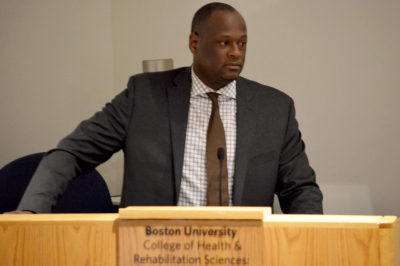
The Boston City Council held a public hearing on Boston University’s campus regarding voter registration — with the council’s Special Committee on Civil Rights deeming Massachusetts laws as too restrictive.
The committee discussed a voter registration cutoff law that requires residents in the commonwealth to register at least 20 days before voting in a state election, at BU’s Sargent College of Health and Rehabilitation Sciences. Though this legislation was officially struck down by a Suffolk County Superior Court judge in July, the decision has been appealed by the state, The Boston Globe reported.
Additionally, the Boston voter registration system requires residents to actively seek out registration information in order to properly be registered as a voting resident in the state.
The docket brought forth at the hearing labeled these laws as disenfranchising to voters. It also claimed that such laws prevented thousands of Boston residents, particularly minorities and those of a low-income background, from casting their ballots in the 2016 presidential primary. In light of these claims, the committee said it hopes to see voter registration deadlines eliminated, as well as same-day registration adopted in state law, according to the docket.
Josh Zakim, District 8 city councilor and chair of the Committee, sponsored the hearing to listen to testimonies about these voter registration issues and possible reform from the public.
“In the interest of our democracy and the interest of our government we want to encourage and make it as easy as possible for people to exercise their right to vote,” Zakim said.
Numerous representatives from City and state organizations at the meeting addressed the impracticality of voter registration in Boston as well as in Massachusetts.
Dion Irish, commissioner of the Boston election department, said he was aware of the low turnout for the preliminary municipal election, which he said was 86 percent lower than what the department had prepared for, as well as the complications residents faced in 2016 due to the 20-day cutoff.
“In the period after the deadline for the 2016 presidential election we had about 1,500 people registered after that deadline and up to election day that theoretically could have been able to participate if we didn’t have that deadline,” said Irish.
David Leonard, president of the Boston Public Library, said the library is a central location for Massachusetts residents to vote, and thus plays a key role in this conversation.
“The Boston Public Library’s mission includes a mission of civic engagement and so, to the extent that our core functions support this process, we’re happy to be a part of a conversation about how to improve participation,” said Leonard.
Zakim suggested Leonard offer voter registration information when residents apply for a library card.
The assistant superintendent of engagement at Boston Public Schools, Monica Roberts, said the lack of information about voter registration in the BPS system is an issue. Roberts suggested the Office of Engagement give workshops or seminars to families in the BPS system to educate them about civic engagement.
“Every year about 40,000 families come into our welcome centers and every family walks out with a welcome packet so that is an opportunity to share information about voter registration and how that might work,” Roberts said.
Anthony Peña, a representative for the Boston Student Advisory Council and high school senior in BPS, said students face several problems when attempting to register to vote.
“Many BPS students are unable to vote due to current limitations that are in place,” Peña said.
Peña said there is little to no education for BPS students about becoming a registered voter and called for more education about civic engagement in the BPS system.
Several Boston residents said there need to be changes made in the way voting registration is handled in the state.
David Vieira, 67, of Hyde Park, said the 20-day cutoff for registration is acceptable and there simply needs to be more thorough civics education in schools.
“I do think that there should be more advertising and outreach,” Vieira said. “There need to be more points at which a citizen is made aware and to have a voter registration form in front of them that they can take home and fill out and send back.”
Pam Wilmot, 57, of Jamaica Plain, said the hearing was a conversation starter for the subject of voter registration and the struggle Boston residents face when attempting to vote in municipal and presidential elections.
“We in New England are a little behind the times,” Wilmot said. “In fact, Maine and New Hampshire have had election day voter registration for a very long time.”
Jonathan Cohn, 29, of Fenway, co-chair of the Issues Committee of Progressive Massachusetts said he hopes to see action on not only around the city but also throughout Massachusetts.
“The two things I would love to see most from a state-legislative angle would be same day registration and automatic registration,” Cohn said.




















































































































